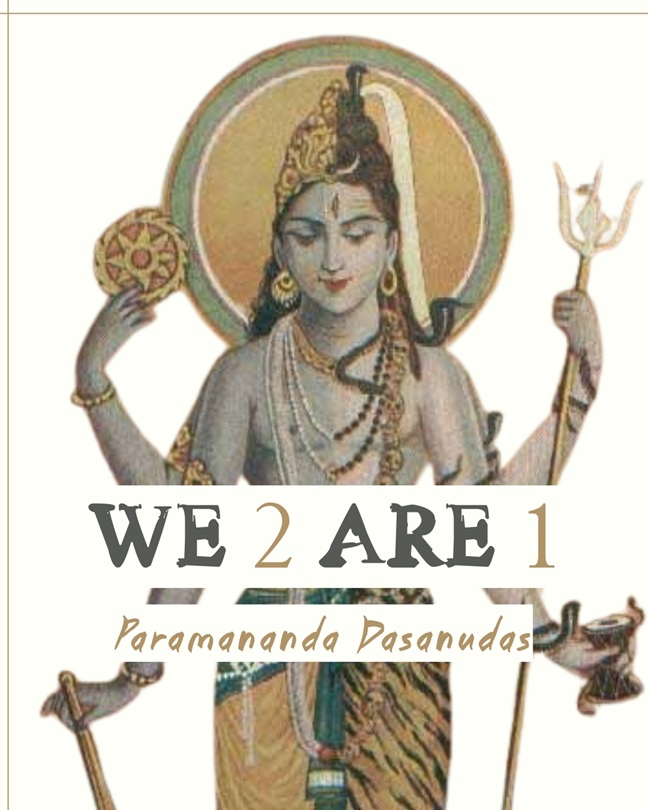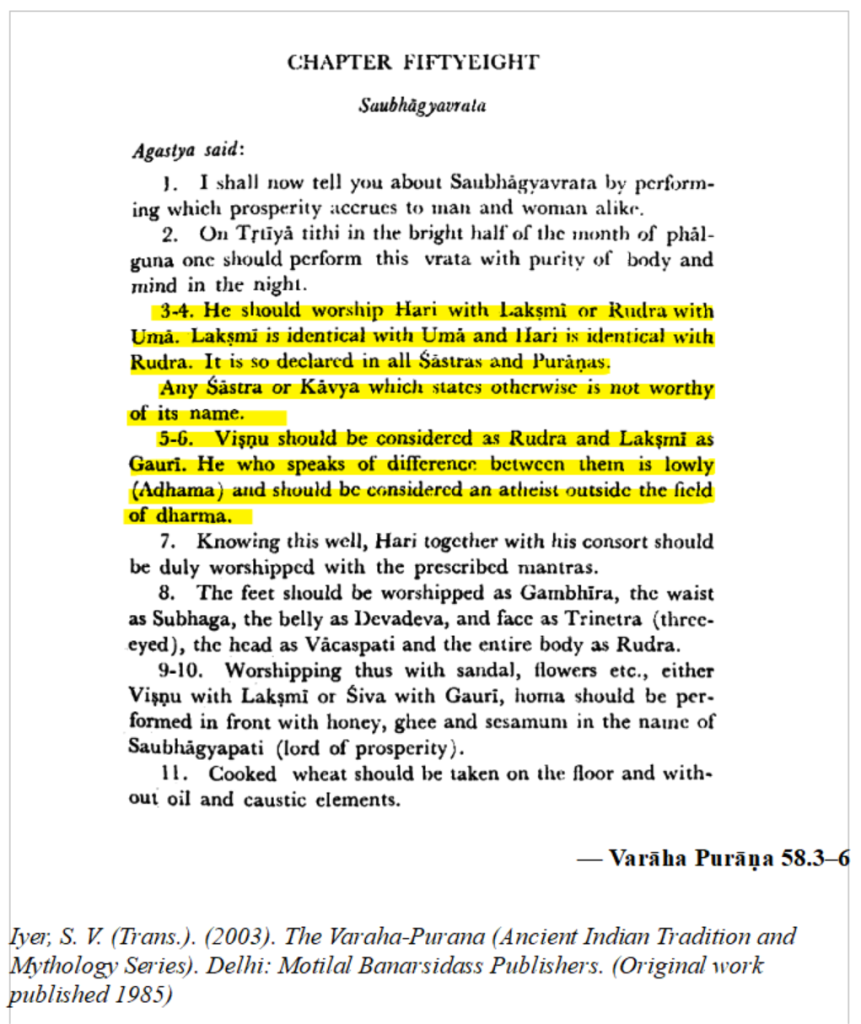
Image of Shiva and Vishnu
Shiva and Vishnu are non different
या श्रीः सा गिरिजा प्रोक्ता यो हरिः स त्रिलोचनः ।
एवं सर्वेषु शास्त्रेषु पुराणेषु च गद्यते ॥3॥एतस्मादन्यथा यस्तु ब्रूते शास्त्रं पृथक्तया ।
रुद्रॊ जनानां मर्त्यानां काव्यं शास्त्रं न तद्भवेत् ॥4॥विष्णुं रुद्रकृतं ब्रूयाच्छ्रीर्गौरीति निगद्यते ।
एतयोरन्तरं ब्रूयात् सोऽधमेत्युच्यते जनैः ॥5॥तं नास्तिकं विजानीयात् सर्वधर्मबहिष्कृतम् ॥6॥
Varāha Purāṇa 58.3–6
Preface
From the very beginning of my journey as a Gauḍīya, I have encountered many challenges in relation to the modern, commercialized interpretations of our sacred philosophy of mysticism. The essence of truth has too often been interrupted, distorted, or concealed—sometimes deliberately—by certain influential voices performing the work of mahā-māyā: hiding that which is self-evident and rooted in the eternal reality. Yet, despite these attempts, the truth cannot be buried. By the grace of destiny, I have been able to distinguish sat from asat, vidyā from avidyā, guided unfailingly by the radiant fire of spiritual light that Śrī Gurudeva has continually bestowed upon this insignificant soul. In that light, the path has shone clearly, even in the midst of the dark forest of material destruction, guiding my heart toward the evolutionary ascent of consciousness.
I write these words with the wish to assist others in perceiving that same light—like a lamp at the end of a long, shadowed tunnel. For those born into Hindu culture, the tattva herein may feel natural, as they grow up in an environment where the underlying understanding is that “all the Gods are One.” This is not to say that every Hindu has grasped the depth of this principle, but they are generally predisposed to accept it.
The greater challenge often lies with seekers from the West, shaped by the rigid frameworks of Abrahamic religions, who attempt to embrace Gauḍīya philosophy without first clearing away the residual structures of their prior conditioning. When such a seeker encounters the truth that Viṣṇu and Śiva are equal in essence, it may produce what modern psychology calls cognitive dissonance: a subtle inner tension that prevents the harmonization of knowledge. This arises because the dominant mindset of both Western religion and science is binary: “This is true; that is false.”
The vision of Śrī Gaurāṅga Mahāprabhu stands in contrast, declaring: “This is the truth, but that is not wrong either.” The realization is that all is God; God is everything; and nothing exists apart from the will of Śrī Kṛṣṇa. Ultimately, Kṛṣṇa manifests Himself in countless forms, yet three primary aspects are to be recognized: Brahmā, Viṣṇu, and Śiva.
Monotheism, as we know it today, is a relatively recent construct, and, paradoxically, its current preachers often worship a deity who, in ancient understanding, was considered a demigod, but not the Supreme. Thus, monotheism rests upon fragile foundations. Gauḍīya philosophy proclaims that Śrī Kṛṣṇa alone is the ultimate, absolute Godhead, yet this truth does not diminish the reality that the Divine may reveal Himself—Herself—in infinite ways. In this eternal vision, Viṣṇu and Śiva are not competitors, but harmonious manifestations of the same Supreme Reality.

Study of the verses with Sanskrit, word-by-word meanings, and translation.
58.3
Sanskrit
या श्रीः सा गिरिजा प्रोक्ता यो हरिः स त्रिलोचनः ।
एवं सर्वेषु शास्त्रेषु पुराणेषु च गद्यते ॥3॥
Transliteration
yā śrīḥ sā girijā proktā yo hariḥ sa trilocanaḥ
evaṃ sarveṣu śāstreṣu purāṇeṣu ca gadyate ॥ 3 ॥
Word-by-word
या (yā) – who, which (feminine singular nominative relative pronoun)
श्रीः (śrīḥ) – Śrī, Lakṣmī, the goddess of fortune
सा (sā) – she, that same one (feminine singular demonstrative pronoun)
गिरिजा (girijā) – Girijā, “daughter of the mountain” (name of Umā / Pārvatī)
प्रोक्ता (proktā) – is said, is declared, is called (feminine past passive participle from √vac, “to speak”)
यः (yaḥ) – who, which (masculine singular nominative relative pronoun)
हरिः (hariḥ) – Hari, name of Viṣṇu
स (sa) – he, that same one (masculine singular demonstrative pronoun)
त्रिलोचनः (trilocanaḥ) – the three-eyed one (epithet of Rudra / Śiva)
एवम् (evam) – thus, in this way
सर्वेषु (sarveṣu) – in all (locative plural of sarva, “all”)
शास्त्रेषु (śāstreṣu) – in the scriptures (locative plural of śāstra)
पुराणेषु (purāṇeṣu) – in the Purāṇas (locative plural of Purāṇa)
च (ca) – and
गद्यते (gadyate) – is stated, is proclaimed (third person singular passive of √gad, “to speak, to say”)
Translation
“She who is Śrī (Lakṣmī) is declared to be Girijā (Umā), and he who is Hari (Viṣṇu) is [the same as] the three-eyed one (Śiva). Thus it is stated in all the Śāstras and in the Purāṇas.”
58.4
Sanskrit
एतस्मादन्यथा यस्तु ब्रूते शास्त्रं पृथक्तया ।
रुद्रॊ जनानां मर्त्यानां काव्यं शास्त्रं न तद्भवेत् ॥4॥
Transliteration
etasmād anyathā yastu brūte śāstraṁ pṛthaktayā
rudro janānāṁ martyānāṁ kāvyaṁ śāstraṁ na tad bhavet ॥ 4 ॥
Word-by-word
एतस्मात् (etasmāt) – from this, than this (ablative singular of etad)
अन्यथा (anyathā) – otherwise, differently
यः (yaḥ) – who
तु (tu) – indeed, but
ब्रूते (brūte) – speaks, says, declares (third person singular present middle of √brū, “to speak”)
शास्त्रं (śāstraṃ) – scripture, authoritative text
पृथक्तया (pṛthaktayā) – as different, separately (instrumental singular of pṛthaktā)
रुद्रः (rudraḥ) – Rudra, Śiva
जनानाम् (janānām) – of people, of beings
मर्त्यानाम् (martyānām) – of mortals
काव्यं (kāvyaṃ) – poetry, mere verse
शास्त्रं (śāstraṃ) – scripture (repeated for emphasis)
न (na) – not
तत् (tat) – that
भवेत् (bhavet) – would be, should be (third person singular optative of √bhū, “to be”)
Translation
“He who speaks of difference between them is lowly (Adhama) and should be considered an atheist outside the field of dharma.”
58.5
Sanskrit
विष्णुं रुद्रकृतं ब्रूयाच्छ्रीर्गौरीति निगद्यते ।
एतयोरन्तरं ब्रूयात् सोऽधमेत्युच्यते जनैः ॥5॥
Transliteration
viṣṇuṁ rudrakṛtaṁ brūyāc chrīr gaurīti nigadyate
etayor antaraṁ brūyāt so’dham ety ucyate janaiḥ ॥ 5 ॥
Word-by-word
विष्णुम् (viṣṇum) – Viṣṇu
रुद्रकृतम् (rudrakṛtam) – made by Rudra, Rudra-formed
ब्रूयात् (brūyāt) – should declare (optative of √brū)
श्रीः (śrīḥ) – Śrī, Lakṣmī
गौरी (gaurī) – Gaurī (epithet of Pārvatī)
इति (iti) – thus
निगद्यते (nigadyate) – is proclaimed (passive of ni + √gad)
एतयोः (etayoḥ) – of these two
अन्तरम् (antaram) – difference
ब्रूयात् (brūyāt) – should declare
सः (saḥ) – he
अधमः (adhamaḥ) – lowest, base
इति (iti) – thus
उच्यते (ucyate) – is called (passive of √vac)
जनैः (janaiḥ) – by people
Translation
“One should declare Viṣṇu to be Rudra-formed, and Śrī to be Gaurī—so it is proclaimed. Whoever speaks of a difference between these two is called ‘lowly’ by the people.”
58.6
Sanskrit
तं नास्तिकं विजानीयात् सर्वधर्मबहिष्कृतम् ॥6॥
Transliteration
taṁ nāstikaṁ vijānīyāt sarva-dharma-bahiṣkṛtam ॥ 6 ॥
Word-by-word
तम् (tam) – him, that person
नास्तिकम् (nāstikam) – atheist, denier of the Veda
विजानीयात् (vijānīyāt) – should know (optative of √jñā)
सर्वधर्मबहिष्कृतम् (sarvadharmabahis-kṛtam) – excluded from all dharma
सर्व (sarva) – all
धर्म (dharma) – dharma, righteousness
बहिष्कृतम् (bahiṣ-kṛtam) – cast out, expelled
Translation
“One should know him to be an atheist, excluded from all dharma.”
Related parallel from the Padma Purāṇa
Padma Purāṇa, Brahma-khaṇḍa 25.15
Sanskrit
शिवस्य श्रीविष्णोर्हि य इह गुणनामादिसकलं
धियाभिन्नं पश्येत् सः खलु हरिनाम-हितकरः ॥
Transliteration
śivasya śrī-viṣṇor hi ya iha guṇa-nāmādi-sakalaṃ
dhiya-bhinnaṃ paśyet saḥ khalu hari-nāma-hita-karaḥ ॥
Word-by-word
शिवस्य (śivasya) – of Śiva
श्रीविष्णोः (śrī-viṣṇoḥ) – of Śrī Viṣṇu
हि (hi) – indeed
यः (yaḥ) – who
इह (iha) – here, in this world
गुणनामादिसकलं (guṇa-nāmādi-sakalam) – all qualities, names, etc.
धियाभिन्नं (dhiya-bhinnaṃ) – regarded as different in thought
पश्येत् (paśyet) – sees, regards
सः (saḥ) – that person
खलु (khalu) – indeed
हरिनाम-हितकरः (hari-nāma-hita-karaḥ) – one who harms the name of Hari
Translation
“To regard all the qualities and names of Śiva and Śrī Viṣṇu as different in one’s thought—such a person is indeed one who harms the holy name of Hari.”
Varāha Purāṇa 73.40
Sanskrit:
न भेदाश्च अवयोर्ज देव एकावावुभावापि ॥
Transliteration:
na bhedāś ca avayor deva ekāvāv ubhāv api
Word-by-word
न (na) – not, no
भेदाः (bhedāḥ) – differences
च (ca) – and
अवयोः (avayoḥ) – of us two
देव (deva) – O Lord
एकौ (ekau) – one (dual form)
आवौ (āvau) – we two
उभौ (ubhau) – both
अपि (api) – indeed
Translation:
“O God, husband of Umā, there is no difference between us two; we are one and the same.”
Nāma-aparādha
ISKCON Mistranslation
2) To consider the names of demigods like Lord Śiva or Lord Brahmā to be equal to or independent of the name of Lord Viṣṇu.
(Source: ISKCON Desire Tree)
This rendering is a clear departure from the Śāstras and from any bona fide commentary on the subject. Through a lack of understanding of higher tattvas, and perhaps unknowingly, ISKCON—under the hand of Swami Bhaktivedanta—has produced a version that inverts the original intent. As a result, many sincere but uninformed followers have been led into serious offenses against the holy names of Hari—offenses which, according to the very scriptures we revere, block the soul from the deeper treasures the Name of Hari bestows upon its faithful servants.
Therefore, I humbly urge all devotees: please reflect deeply and realign your understanding before it is too late. The Śāstras are unambiguous—such a mentality distances one from Dharma itself, what to speak of para-dharma. It matters not who your leader may be; to hold this mistaken view is to risk offending the Names of Hari.
Śāstric Teaching vs Mistranslation
| Śāstra (Padma Purāṇa, Brahma-khaṇḍa 25.15) | ISKCON Translation |
|---|---|
| Sanskrit: शिवस्य श्रीविष्णोर्हि य इह गुणनामादिसकलं धियाभिन्नं पश्येत् सः खलु हरिनाम-हितकरः ॥ Transliteration: śivasya śrī-viṣṇor hi ya iha guṇa-nāmādi-sakalaṃ dhiya-bhinnaṃ paśyet saḥ khalu hari-nāma-hita-karaḥ ॥ Literal Translation: “To regard all the qualities and names of Śiva and Śrī Viṣṇu as different in one’s thought—such a person is indeed one who harms the holy name of Hari.” | ISKCON Translation: “To consider the names of demigods like Lord Śiva or Lord Brahmā to be equal to or independent of the name of the Lord Viṣṇu.” (Source: ISKCON Desire Tree) |
Analysis of the Deviation
The original verse warns against disrespecting Śiva by separating him from Viṣṇu, while ISKCON’s rendering encourages that very separation—thus teaching the opposite of the Śāstra.
Śāstra: Condemns seeing difference between Śiva and Viṣṇu, affirming their non-difference (abheda-tattva).
ISKCON: Alters the meaning to condemn seeing equality between Śiva (called a “demigod”) and Viṣṇu.
Final words
As we can see from the verses studied, a true Vaiṣṇava and genuine Gauḍīya practitioner should never engage in mental speculation or make artificial distinctions between Mahādeva Śiva and Śrī Viṣṇu. Such thinking constitutes aparādha—an offense—that the true ācāryas of Vaiṣṇavism and Gauḍīya tradition have always avoided.
It is true that in certain poetry or writings, some great masters have expressed apparent differences. However, these distinctions arise purely from bhāva—the personal devotional sentiment of the master—not from any intrinsic superiority of Viṣṇu over Śiva. For example, in my own heart, Gopīnātha is dearer to me than Dvārakādiśa, simply because I have no attraction for the opulent (aiśvarya) form of Kṛṣṇa the king in Dvārakā. My Kṛṣṇa is the eternal king of Rādhārāṇī’s heart, only and forever.
In the same way, some highly respected masters may speak of differences between Śiva and Viṣṇu, but such statements are born only of their intimate devotional moods—not from the siddhānta (conclusive truth) that one is superior to the other.
Consider also the case of asking Śrī Hanumān Mahāvīra, “Who is superior—Kṛṣṇa or Rāma?” Without hesitation he would answer, “Rāma.” Does this make Hanumān wrong? Certainly not. The tattva remains the same: Rāma and Kṛṣṇa are both the Supreme Lord. Likewise, from the perspective of siddhānta, Śiva and Viṣṇu are nondifferent. This truth is upheld and affirmed by all genuine scriptures.
Paramānanda Dāsānudās
MAHAMANTRA.INFO




